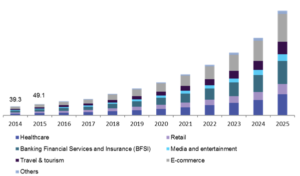- Posted on
- Sujyoti Jha
- No Comments
- Uncategorized
Chatbots have become increasingly prevalent in the healthcare industry due to their ability to enhance patient care, improve efficiency, and provide timely and accurate information. Here are some common use cases and benefits of chatbots in the healthcare industry:
Appointment Scheduling
Chatbots can assist patients in scheduling appointments with healthcare providers, eliminating the need for lengthy phone calls or waiting on hold. They can also provide reminders and notifications about upcoming appointments.
Symptom Assessment and Triage
Chatbots can ask patients a series of questions to assess their symptoms and provide appropriate recommendations. They can help patients determine whether they need immediate medical attention or if self-care measures would suffice.
Medication Reminders
Chatbots can send reminders to patients about taking their medications on time and in the correct dosage. They can also answer basic questions about medications, such as potential side effects or interactions.
Health Education
Chatbots can provide patients with information about various health topics, such as common diseases, healthy lifestyle practices, and preventive measures. They can also offer personalized health tips based on the user’s profile and medical history.
Mental Health Support
Chatbots equipped with natural language processing capabilities can engage in conversations with individuals experiencing mental health issues. They can provide emotional support, offer coping strategies, and guide users to appropriate resources or professionals when necessary.
Remote Monitoring
Chatbots can collect and analyze patient-generated health data, such as blood pressure readings or glucose levels. This information can help healthcare providers monitor patients remotely, identify trends, and intervene when needed.
Post-Discharge Support
Chatbots can follow up with patients after they have been discharged from the hospital, providing guidance on postoperative care, answering questions about medications or symptoms, and addressing concerns.
Administrative Support
Chatbots can handle administrative tasks, such as processing insurance claims, answering billing inquiries, and assisting with patient registration. This can free up staff time and improve overall operational efficiency.
The benefits of using chatbots in the healthcare industry include 24/7 availability, improved access to information, reduced waiting times, personalized interactions, and cost savings for healthcare organizations.
However, it’s important to note that chatbots should not replace human healthcare providers but rather complement their services by handling routine tasks and providing initial support.
Growth of chatbot in medical field
Some impactful points highlighting the growth of chatbots in the medical field and healthcare industry:
Improved Patient Engagement : Chatbots engage patients in personalized conversations, offering quick and convenient access to healthcare information, resulting in improved patient engagement and satisfaction.
Enhanced Access to Healthcare: Chatbots provide round-the-clock accessibility, enabling patients to receive immediate responses to their queries and concerns, regardless of their location or time zone.
Efficient Triage and Diagnosis: Chatbots equipped with advanced algorithms can assist in triaging patient symptoms, providing preliminary diagnoses, and offering appropriate recommendations, thereby optimizing healthcare resources.
Remote Patient Monitoring: Chatbots can collect and analyze patient-generated health data, enabling remote monitoring of conditions and allowing healthcare providers to intervene proactively when necessary.

Health Education and Awareness: Chatbots serve as virtual health educators, disseminating accurate and relevant information on various health topics, promoting healthy behaviors, and empowering patients to make informed decisions.
Medication Management: Chatbots help patients adhere to medication schedules by sending reminders, providing dosage instructions, and addressing medication-related questions, ultimately improving medication adherence and patient outcomes.
Mental Health Support: Chatbots play a vital role in providing mental health support, offering empathy, guidance, and coping strategies to individuals experiencing stress, anxiety, or depression.
Streamlined Administrative Processes: Chatbots automate administrative tasks such as appointment scheduling, billing inquiries, insurance claims processing, and patient registration, streamlining workflows and reducing administrative burdens for healthcare staff.
Cost Reduction: By automating routine tasks, chatbots reduce operational costs for healthcare organizations, optimize resource utilization, and minimize errors in administrative processes.
Continuous Learning and Improvement: Chatbots leverage machine learning and natural language processing to continually learn from user interactions, improving their accuracy, understanding, and ability to provide personalized and relevant responses over time.
These all points show the growth and positive impact of chatbots in the medical field and healthcare industry, transforming patient experiences, optimizing workflows, and driving better healthcare outcomes. The growth of chatbots in the medical field and healthcare industry is driven by the desire to improve patient care, enhance efficiency, and deliver accessible and personalized healthcare services. As technology continues to advance, chatbots are expected to play an increasingly vital role in transforming the healthcare landscape.


